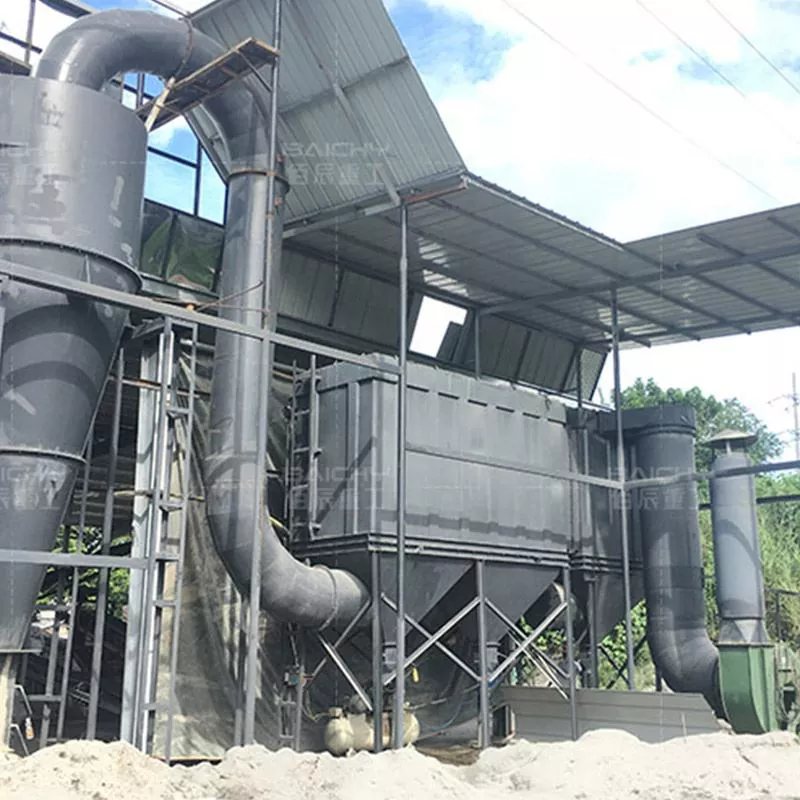Why Is a Dust Collector Essential for a Cleaner and Safer Workspace?
2024-12-26
In many industries and work environments, dust is an inevitable byproduct of various operations. Whether it's woodworking, metalworking, or manufacturing, dust can accumulate quickly and pose significant health and safety risks. This is where a dust collector comes into play. But why is it so important, and how does it contribute to maintaining a cleaner, healthier, and safer workspace?
In this blog, we’ll dive into the significance of dust collectors, their benefits, and why they should be an essential part of any workspace that deals with dust and particulate matter.
1. What is a Dust Collector?
A dust collector is a device designed to capture and remove dust, debris, and other particulate matter from the air in industrial and commercial settings. These systems are typically composed of a filtration unit, blower, and ductwork, which work together to draw in air, filter out dust particles, and release clean air back into the environment.
Dust collectors are essential in industries that deal with wood, metal, chemicals, pharmaceuticals, and other materials that produce fine dust particles during processing. They are available in various designs, including baghouses, cyclone dust collectors, and cartridge-style systems, to cater to different dust collection needs.
2. Why is Dust Control Important?
Dust may seem harmless, but prolonged exposure to dust in the workplace can lead to serious health issues such as respiratory problems, allergies, lung diseases, and even long-term conditions like asthma or silicosis. Additionally, dust accumulation can create fire hazards, as certain types of dust, like metal dust, are flammable and can cause explosions when exposed to heat or sparks.
Implementing an effective dust collection system can help mitigate these risks by keeping dust levels under control and maintaining a healthier work environment. Let’s take a closer look at some of the reasons why dust control is crucial:
- Health and Safety: Dust exposure can lead to chronic respiratory diseases and other health problems. By using a dust collector, workplaces can significantly reduce airborne dust and minimize the risk to employees' health.
- Fire and Explosion Prevention: Certain types of dust (e.g., wood, coal, metal) are combustible, and an accumulation of fine dust particles can create explosive environments. A dust collector helps reduce the risk of these dangerous situations.
- Equipment Protection: Dust can also damage machinery, electrical components, and other equipment, leading to costly repairs and downtime. Keeping the workspace clean with a dust collection system helps preserve the life of equipment.
- Regulatory Compliance: Many industries are subject to strict environmental and safety regulations regarding dust control. A properly installed dust collection system helps companies stay compliant with these regulations.
3. How Does a Dust Collector Work?
A dust collector works by utilizing a filtration system to capture dust particles and prevent them from entering the air. Here’s how the process typically works:
- Air Intake: The dust collector pulls air containing dust and particulate matter from the work environment using a powerful blower or fan. This can be done through ducts that connect to machines or workstations generating dust.
- Filtration: The air then passes through a series of filters that trap dust particles. These filters can be made from materials like fabric, paper, or mesh, and they vary in size and capacity depending on the type of dust being collected.
- Dust Storage: The captured dust is then stored in a bin or hopper. In some systems, the dust can be compressed or bagged for disposal.
- Clean Air Release: Finally, the filtered air is released back into the environment, now free of harmful particles.
Some advanced dust collectors also include features like automatic cleaning mechanisms for filters, ensuring the system runs efficiently without frequent maintenance.
4. What Are the Benefits of Using a Dust Collector?
Investing in a dust collector brings a range of benefits to the workplace:
- Improved Air Quality: By removing dust from the air, a dust collector improves indoor air quality, making the workspace more comfortable and healthier for employees.
- Enhanced Productivity: Cleaner air and fewer dust particles can reduce respiratory issues, fatigue, and discomfort among workers. This, in turn, can lead to improved focus, morale, and productivity.
- Cost Savings: Although dust collectors require an upfront investment, they can save money in the long run by preventing costly machinery breakdowns and health-related absences. They also reduce the need for manual cleaning, which can be time-consuming and inefficient.
- Compliance with Standards: Many workplaces are required to adhere to workplace safety and environmental regulations. Installing a dust collector helps ensure compliance with local and international standards for air quality and workplace safety.
- Reduced Risk of Fires and Explosions: As mentioned earlier, dust buildup can create a hazardous environment. A dust collector helps reduce the risk of fire or explosion, which can be catastrophic for both personnel and property.
5. When Should You Invest in a Dust Collector?
If your workplace involves processes that generate a significant amount of dust, investing in a dust collection system is not just a good idea—it's a necessity. Here are a few scenarios where a dust collector should be a priority:
- Woodworking and Carpentry: Sawdust and wood particles are among the most common types of dust produced in these industries. A dust collector can help prevent wood dust from accumulating and creating health and fire hazards.
- Metalworking: Processes like grinding, cutting, and sanding metal can release fine particles that are harmful to the lungs and can even cause fires. A dust collector is crucial for these environments.
- Pharmaceutical and Chemical Manufacturing: Fine powders in the pharmaceutical and chemical industries can be hazardous to both the health of workers and the environment. A dust collector ensures these particles are contained and properly filtered.
- Mining and Construction: Dust generated from mining, demolition, or construction can contain harmful substances like silica. A dust collection system is essential for reducing exposure to these dangerous particles.
6. How to Choose the Right Dust Collector?
Choosing the right dust collector depends on several factors, including the size of your workspace, the type of dust being produced, and the volume of dust generated. Key considerations include:
- Type of Dust: Different types of dust require different filtration systems. For instance, fine, dry dust may require a more specialized filter than larger particles.
- Airflow Requirements: A system’s airflow capacity should match the volume of dust being generated. A professional can help assess the airflow needs based on your specific operations.
- Space and Design: Consider the size and layout of your facility. You may need a portable or stationary system, depending on the available space.
- Maintenance and Efficiency: Look for a dust collector that offers easy maintenance and efficient performance, with features like automatic filter cleaning and minimal energy consumption.
Conclusion
Dust collectors are an essential piece of equipment in workplaces where dust and particulate matter are common. Not only do they help maintain a clean and safe environment, but they also improve air quality, prevent health problems, reduce fire risks, and contribute to compliance with safety regulations. Investing in a quality dust collection system is an investment in your employees’ well-being, the longevity of your equipment, and the overall success of your business.



